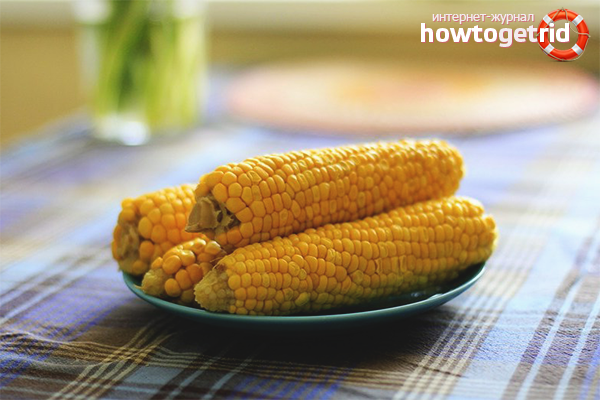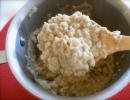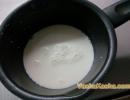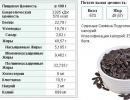The benefits and harms of boiled corn. Calorie content and composition
For many years, corn has been hailed as a divine food by people of all races and ages. A vegetable native to Central and South America belonged to the sacred class. For this reason, it was consumed in boiled form slowly and without further ado. Later, the cereal appeared in Europe and Russia, gaining even greater popularity. Today, many people are interested in the question regarding the harm and benefits of boiled corn. Due to the large accumulation of beneficial enzymes, it is difficult not to pay due attention to this.
Calorie content and composition of corn
- Compound. Corn is famous for its rich composition. It includes ash, water, saturated acids, di- and monosaccharides, starch (more than in potatoes and rice). In addition, the product includes useful minerals such as fluorine, copper, manganese, calcium. We should not forget about zinc, cobalt, magnesium, iodine, potassium, sodium and phosphorus. It is difficult not to mention the presence of vitamins of different groups, including E, B1-B5, B9, C, PP.
- Calorie content. Having used 100 gr. boiled corn, you will saturate the body with 125 kcal. Of these, fats occupy 2.4 grams, proteins - 4.2 grams, carbohydrates - 22.4 grams. If we talk about a canned vegetable, the calorie content is reduced to 119 Kcal., Where 3 gr. - proteins, 22.6 gr. - carbohydrates, 1.4 gr. - fats.
Useful properties of boiled corn
- The main difference between corn and other cereals is the preservation of all useful enzymes after a long heat treatment. The minerals and vitamins listed above remain in the amount of 83-85%, no other vegetable can boast of this.
- The lion's share of vitamins normalizes the work of the body at the intracellular level. Regular consumption of boiled corn maintains the water-salt balance, controls blood cholesterol, stimulates metabolic processes, and tones the psycho-emotional background.
- Corn is the only vegetable of the genus that contains real gold. The metal is used for domestic and medical purposes to stop leprosy, tuberculosis, lupus, and other complex diseases.
- Cereal culture improves brain activity, accelerating the absorption of information and memory. It is difficult not to mention that the food stabilizes the work of the heart muscle and maintains blood pressure at the proper level (relevant for hypo- and hypertensive patients).
- Experienced doctors unanimously say that boiled corn is recommended for those who have impaired liver and respiratory system functions, as well as kidney failure. Corn prevents clogging of blood vessels by freeing the lungs from resin (useful information for smokers).
- Due to the high nutritional value and the accumulation of vitamins, boiled corn is quickly absorbed by the body. Saturation is maintained for a long time, which allows overweight people to dull the feeling of hunger. Cereal speeds up metabolism, raises the "combat spirit", saturates with energy.
- For people who constantly struggle with stress and suffer from insomnia, corn helps to calm down. It normalizes the nervous system, eliminates unnecessary stimuli and induces sleep.
- The vegetable is often used prophylactically to prevent infertility, male dysfunction and other pathologies of the genital organs. Corn forms bone tissue, strengthens hair and nails, promotes the production of collagen in the skin.
- Especially valuable corn is considered for people with atherosclerosis. It should be consumed 1 cob per day to protect the walls of blood vessels from deposits and blockage. If cholesterol is elevated in the body, corn is consumed in the amount of 2 ears per day. It weeds out the "bad" and leaves the good.
- Cereal culture increases the tone of the walls of the gallbladder. It accelerates the frequency of contractions, normalizing metabolic processes.
- Corn contributes to the rapid removal of ethyl alcohol, so it is often eaten in the morning after a grand feast. In addition, boiled grains prevent stomach diseases in people who abuse junk food.
- Those who experience chronic fatigue, apathy, constant malaise should eat at least 60 grams. boiled corn kernels per day. Already after a month, blood circulation will increase, sleep will normalize.

- Corn has a relatively low calorie content, but high energy value due to incoming carbohydrates (more than 22 grams). It is for this reason that it is easily absorbed by the body and is not deposited in problem areas.
- The content of saccharides allows you to feel good throughout the diet. Reduced blood pressure, malaise. The heart is not stressed.
- To increase metabolism, it is enough to include 1-2 cobs (100, 200 Kcal, respectively) of boiled vegetables in the daily menu. It is preferable to consume corn before 14.00 hours.
- Experienced nutritionists recommend leaning on a boiled vegetable on fasting days. In this simple way, you clean the intestines and prevent constipation.
- To reap the full benefits, stick to the corn diet for a month, then take a week off. When eating, chew slowly, you can add grains to salads, first and second courses.
Harm of boiled corn
- The restrictions imposed on the use of cereals are more related to the components that are used in the cultivation of corn. The product is chemically processed extremely strongly, but the cobs do not absorb harmful substances. They are difficult to modify, therefore they are environmentally friendly crops.
- Obviously, eating a vegetable is not recommended for people with individual intolerance to corn. To identify an allergy, just eat a couple of grains and wait. If side effects are present (nausea and vomiting, rash, general malaise), the cereal should be discarded.
- It is forbidden to eat corn for people at risk of blood clots. The fact is that the vegetable, even after heat treatment, retains vitamin K, which affects blood clotting (improves it). Eating cereal can be hazardous to your health.
- At risk are people with impaired activity of the pancreas, digestive tract. In your body, cereal will be absorbed more slowly, especially if you have gastritis or an ulcer.
- It should be remembered that corn provokes increased gas formation and bloating, even when using the daily norm (up to 200 gr.). If you have duodenal disease, stop eating.
Corn cobs retain up to 85% of vitamins and minerals even after prolonged heat treatment. The vegetable is recommended for people with atherosclerosis, unstable blood pressure, overweight. Contraindications include individual intolerance, flatulence, problems with the digestive system, thrombosis.
Video: how to cook corn





